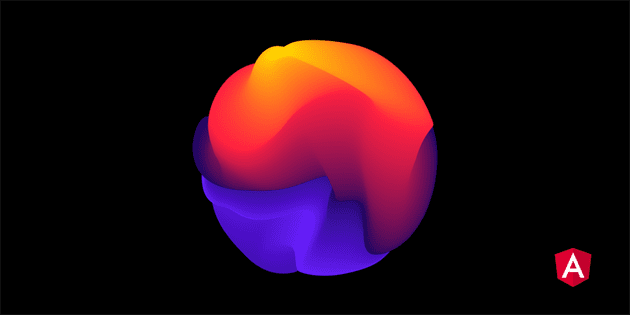All in all, we have just finished a successful comparison of AngularJS and React JS, which are widely used by developers to develop their projects in any way and perspective they need. After examining all the core features of AngularJS and the advantages of ReactJS, it is easy to come to an agreement that if you need to develop a pretty easy, small and simple application that won't take all your time and become one of your primary projects, you have to select ReactJS undoubtedly. The flip side is that AngularJS is a great choice for those that desire the integral approach to web development and maximum productivity in team work.
What is Angular?
Angular is a free and open-source web application framework written in TypeScript. This framework is used to create single-page client applications and scalable web applications. Angular has a large set of well-integrated libraries and features. This platform also has a set of developer tools for developing and scaling projects.
Before we get into the React vs Angular battle, we need to explain the main purpose of Angular. Angular is the most popular framework for developing scalable, robust and high-performance web applications using HTML, CSS, and TypeScript. The framework has a similar type of security to what developers know from other languages such as Java or C#. Many users wonder what framework is better Angular or React for net developers? Angular uses TypeScript, which is much closer to C# than JavaScript, so .NET developers prefer Angular to React.
The latest version of Angular is Angular 15, which contains many new features, including Stable Standalone APIs, Http with provideHttpClient, Directive Composition API, Optimized CLI, Improved Stack Traces for Debugging, Automatic Imports in Language Service, Dependency injection, and much more. Below we have given you a list of Angular versions, as well as pros and cons of this framework.
Angular Versions History: Angular 10-15
To win in the Angular.js vs React.js competition, the Angular team strives to ensure that the framework is stable, the ecosystem around Angular thrives, and it is constantly evolving. For this purpose, regular platform updates are performed. Let's take a look at the history and different versions of Angular since the 10th version.
- Angular 10
Angular 10 was released on June 24, 2020. This is a major release. This release includes new default browser configuration, compiler update, performance improvement, many bug fixes, and other features.
- Angular 11
Angular 11 was released on November 11, 2020. This release includes improved logging and reporting, updated language service preview, updated HMR support, webpack 5 support, and much more.
- Angular 12
Angular 12 was released on May 12, 2021. The features of this version include nullish coalescing, style improvements, CLI strict mode-by default, improvements in CSS, new version of TypeScript, deprecation of the View Engine, and so on.
- Angular 13
Angular 13 was released on November 04, 2021. Key features include APF improvements, enhancements to Angular tests, end of IE11 support, Router improvements, improvements in localization, component API updates, removal of View Engine, and other features.
- Angular 14
Angular 14 was released on June 02, 2022. Of the features of the release, we can highlight typed Angular forms, extended developer diagnostics, tree-shakeable error messages, CLI auto-completion, improved template diagnostics, optional injectors, new component dev kit primitives, and so on.
- Angular 15
Angular 15 was released on November 16, 2022. The main features of this version are stable standalone components API, functional router guards, improved stack traces, reuse of UI logic, directive composition API, dynamic router outlet names, CDK Listbox, extended esbuild support, and other features.
Benefits of Angular
Angular offers programmers and entrepreneurs a large set of benefits. This framework is versatile, combining business logic and user interface elements. Below, we have listed the main benefits of Angular over React:
- Clean code development and dependency injection is available to developers.
- Given that the Angular can handle routing, switching from one view to another is easy.
- Developers can use the many Angular libraries to create robust template solutions.
- Angular extends the HTML syntax and allows you to create reusable functional components.
- Implementation of the MVC pattern.
- New features can be updated using the CLI.
- One of the great advantages of Angular over React is that Angular supports dependency injection.
Disadvantages of Angular
Despite the huge popularity and effectiveness of Angular, it has numerous disadvantages. Now we will list the main disadvantages and problems associated with the use of Angular:
- Some difficulties when upgrading from earlier versions to newer ones.
- The framework's limited capabilities for SEO and poor availability for search engines.
- A complex process of integration with third parties.
- Possible slowdowns if pages contain interactive components.
- Angular is not suitable for small and medium-sized projects.
- Because of the limited routing, there are difficulties in debugging scopes.
- Hard learning curve.
- There is no clear manual or complete documentation.
- Difficult for beginners.

What is React.js?
React is an open-source JavaScript library developed by Facebook in 2013 and used for frontend development. As soon as it appeared, React quickly conquered the market and eclipsed all popular frameworks of that time, even AngularJS. The main purpose of React is to create user interfaces or user interface components.
React for Angular developers can be difficult to learn because these frameworks take different approaches to web development. The component-based nature of the framework allows developers to create interactive and complex user interfaces without any problems. React is managed by Facebook and a community of developers from around the world. The modularity and consistency of React components provides reusability and helps accelerate development time. The library of React focuses on rendering speed.
Create React App is a comfortable, useful, and flexible environment for learning React and starting new single-page applications. React allows developers to create seamless UX and complex user interfaces. This framework supports web and mobile application development. Moreover, React offers developers the concept of Virtual DOM, which differs from the standard DOM and introduces a new JSX scripting language that makes working with XML easier. Now let's move on to the advantages and disadvantages of React.
What are the Benefits of React.js?
React JS makes the process of creating user interfaces convenient and efficient. The framework allows developers to create impressive web applications that require minimal effort from them. Below, we have listed the main advantages of using React:
- Easy to learn.
- HTML-like syntax allows developers to create templates.
- ReactJS increases code stability by using downward data binding.
- Improved server-side rendering capabilities.
- The framework allows developers to migrate between versions.
- An open-source Facebook library.
- Virtual DOM creates a better user experience and improves development efficiency.
- The ability of React to reuse code components at any time allows back-end developers and front-end developers to save a significant amount of time.
Disadvantages of ReactJS
Despite its reliability and thoroughness, React has certain disadvantages. We have listed some shortcomings and problems of React:
- Integrating React with an MVC framework requires a lot of customization.
- The framework is constantly changing with new updates that often take developers by surprise.
- ReactJS has poor documentation, which worsens the learning curve.
- SEO problems with the fact that the major search engines cannot index dynamic web pages with client-side DOM rendering.
- JSX is difficult for new developers to master.
Difference between Angular and React
Many developers don't know whether to choose Angular or React for product development. To help you make the right choice for your next project, we'll shed some light on the difference between Angular and React. To give you an idea, what is the difference between Angular and React, we have listed the table below.
|
Parameters |
React |
Angular |
|
Type |
React is a JavaScript library for building user interfaces, and it is much older than Angular. |
Angular is a full-fledged framework for software development. |
|
Performance |
React works with the virtual DOM, so when the view changes, the new DOM is compared with the virtual DOM and updated correspondingly. This leads to performance boost, optimized use of the memory, more efficient way of updating the view and other positive aspects. |
Angular creates a watcher for every binding to capture DOM changes. Therefore, every time the view is updated, the new values are compared to the old ones. In large applications, this leads to performance issues. |
|
Learning Curve |
React is much easier to learn than Angular. Developers need to learn JSX, the routing library, and the state management libraries. |
Learning Angular is difficult for beginners, it requires a lot of studying. To master Angular development, you need to learn many topics, including modules, directives, components, services, templates, and so on. |
|
Componentization |
Componentization is done by encapsulating all HTML and JavaScript elements into a JSX file. |
Componentization works by copying the selector, template, style, and many other properties that make up the metadata for component processing. |
|
Size of Application |
React JS lacks standard templates and components, so the time it takes to develop large and scalable applications using React is longer than Angular. Thus, React is more effective when developing lightweight applications. |
Angular is commonly used when creating enterprise solutions. With TypeScript's customized features, developers can create large-scale projects. As the code grows, TypeScript allows developers to organize it into modules, which promotes better control when scaling. So for creating enterprise solutions, Angular is better than React. |
|
Data Binding |
React has one-way data binding. |
Angular has two-way data binding. |
|
UI Components |
A wide range of user interface components. |
Angular includes many material design components. These components simplify the customization of the user interface. |
|
Testing & Debugging |
There is a set of tools used in React to do different kinds of testing and debugging. |
It is possible to test and debug a project with a single tool. |
|
Language Preference |
JSX |
TypeScript |
|
GitHub Stars |
198k |
85k |
Benefits of React over Angular
In this section, we will provide a list of benefits of React.js over Angular and pain points caused by AngularJS. React is more popular than Angular, easier to learn and more performant.
Learning Curve
React has a low learning curve compared to Angular. Even though React is incomplete, and you need to use state management libraries to manage states in a complex React application, this framework is still easy to learn. Angular, unlike React, has a high learning curve.
Performance
Performance is an important factor for most developers. Due to its high performance, React is better for web development than Angular. React uses a virtual DOM, while Angular uses a traditional DOM. The React virtual DOM is faster compared to the Angular traditional DOM. Thanks to the unidirectional data flow of React, state changes are made carefully even in large-scale projects. Unidirectional data flow makes it effortless to manage data flow in React, even for large projects. The bidirectional Angular data flow makes working with data complicated.
Good for Small Projects
One of the significant benefits of using React.js is its convenience when working with small projects. Using Angular to develop small web applications is unnecessary because it takes more time to work with all the intricacies of the framework than it does to implement the business logic. For small projects, React is better than Angular. React is a simple framework that does not focus on many things, but focuses only on creating user interfaces.
Documentation
Both frameworks are constantly being improved and updated. React documentation is updated relatively faster than Angular. Developers speak well of the React documentation because it contains detailed solutions to common problems.
Backward Compatibility
Among other advantages of React over Angular, we can highlight the backward compatibility. The ability to quickly update the architecture with the addition of new modules is important for any developer. In Angular, developers cannot migrate from one version to another, say, from Angular 10.0 to 15.0. To migrate from one version to another, developers need to install updates between versions. React has full backward compatibility. Thus, for developers who plan to improve the project gradually by adding new features, React is the best choice.
When To Use React.js?
Now that you know the benefits of using React, we will discuss the main favorable parameters for choosing React.

- React is easy, it is faster to learn and get started.
- This framework allows developers to use third-party libraries in the web application development process.
- Bidirectional data binding process.
- The presence of many modern tools with which developers can easily personalize a web page.
- Your development team has good knowledge of HTML, CSS, and JavaScript.
- You want to create an application with multiple events.
- The library of React is SEO-friendly, and it focuses on rendering speed.
- Your project requires dashboards or data visualization tools.
- React offers better cross-platform opportunities than Angular.
When To Use Angular?
We have already mentioned the benefits of using Angular framework, now it's time to look at some favorable parameters for selecting Angular for product development.
- You want to build a multifunctional enterprise-grade solution.
- If you would like to develop a real-time application.
- You would like to develop a complex and scalable solution.
- Your mobile app development is well versed in C#, and Java.
- If you will be developing an application for streaming video or ecommerce application.
- To create progressive web apps using the Angular CLI tools.
Angular or React - Which is Better?
It is difficult to answer unambiguously what is better React or Angular, it all comes down to personal preference here, since both frameworks solve the same problems, but in different ways. You can develop the same application, but in different ways. Both frameworks are popular, reliable, secure, and powerful, and give developers options in making the web development process easier and faster.
To better understand whether Angular.js or React.js is better for web application development, consider that React is superior to Angular in terms of optimization through the use of virtual DOM and rendering optimization. Another advantage of React is the easy transition between versions because you don't need to install updates one by one as you do with Angular. With improved server-side rendering capabilities, React is a more robust platform for content-oriented applications.
React allows developers to accelerate the process of solution development and allows reducing the number of errors. Moreover, React has an easier learning curve, so the learning time of this framework is significantly shorter compared to Angular. React has easy ways to reuse UI components, offering developers an easy way to get work done. Because React uses a unidirectional data flow, it's easier for developers to spot bugs and fix them.
If you are thinking what is better Angular or React for Java developer, we must notice, that Java developers, are more likely to choose Angular, and React is more popular among Node.js developers. If you intend to create a multifunctional enterprise-level application with a long development process, Angular will suit you best, and even a steeper learning curve will not be a problem in this case. Furthermore, to implement complex functionality into an application, and to create a progressive, single-page or native web application, Angular is the best choice.
Thus, if we compare all the advantages and disadvantages of both Angular.js and React.js, and all the use cases, React will have a slight advantage over Angular. In most cases, it is better for you to select React for web application development.
Conclusions
Popular in blog
View allWe’ll contact you within a couple of hours to schedule a meeting to discuss your goals.
- PROJECT INQUIRIES info@artjoker.net
- CALL US +1 213 423 05 84
contact us:









